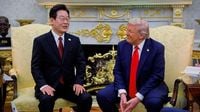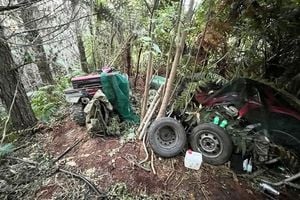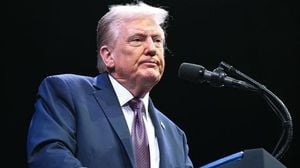In a move that has sent shockwaves through international business circles and diplomatic corridors alike, U.S. federal officials conducted a sweeping immigration raid at the Hyundai-LG battery factory construction site in Ellabell, Georgia, on September 4, 2025. The operation, which authorities described as the "largest-ever" workplace raid, resulted in the detention of 475 individuals—most of them South Korean nationals—according to Fox News and Reuters. The fallout from this unprecedented enforcement action is now reverberating across the Pacific, threatening to strain the vital alliance between the United States and South Korea and casting a shadow over future economic cooperation.
The raid came at a particularly sensitive moment. Just ten days earlier, South Korean President Lee Jae Myung had sat down with U.S. President Donald Trump in the Oval Office, where both leaders publicly pledged to deepen business ties and expand cooperation between their countries. That spirit of partnership now faces a stern test, as South Korean officials and business leaders grapple with what they describe as a stinging rebuke from an administration that had, until recently, been actively courting billions in Korean investment.
"It’s a grave situation," South Korean Foreign Minister Cho Hyun told reporters before departing for Washington on September 8, 2025, as reported by Fox News. His urgent trip underscored the seriousness with which Seoul views the incident. Cho said he was in close communication with U.S. counterparts following the mass detainment, and he made it clear that the matter would be a top priority in his talks with American officials.
The details of the alleged immigration violations remain murky. However, South Korean officials suggested that many of the detained workers may have overstayed their 90-day visa waivers, thereby violating the terms of their temporary entry into the United States. Finance Minister Koo Yun-cheol offered further context, telling Reuters that some of the experts had traveled to Georgia to assist with a test run of the electric vehicle battery factory, which was slated to begin production in October 2025. "You need to get a visa to do a test run, but it's very difficult to get an official visa. Time was running out, and I think experts went to the United States," Koo said.
Images from the scene, widely circulated by Fox News and other outlets, show federal agents detaining workers at the sprawling construction site. The operation was swift and, by all accounts, meticulously coordinated—a clear signal that immigration enforcement remains a top priority for the Trump administration, even when it involves workers from key allied nations.
President Trump himself addressed the controversy in a Truth Social post on September 7, 2025, seeking to strike a balance between welcoming foreign investment and upholding U.S. immigration laws. "Following the Immigration Enforcement Operation on the Hyundai Battery Plant in Georgia, I am hereby calling on all Foreign Companies investing in the United States to please respect our Nation’s Immigration Laws," Trump wrote. He added, "Your investments are welcome, and we encourage you to LEGALLY bring your very smart people, with great technical talent, to build World Class products, and we will make it quickly and legally possible for you to do so. What we ask in return is that you hire and train American Workers."
The president’s statement attempted to reassure both foreign investors and domestic workers, but it did little to quell the anger in Seoul. According to the Financial Times, South Korean officials described the mass detainment as "a slap in the face" from a White House that has, in their view, benefited immensely from Korean capital while now targeting their workers for enforcement. One unnamed official told the Financial Times that the move had left many in the Korean government and business community feeling betrayed.
The backlash has not been limited to government circles. Some of South Korea’s largest conglomerates are reportedly reassessing their U.S. investment plans, wary of further disruptions or what they perceive as shifting rules of engagement. The Hyundai-LG battery plant, a flagship project intended to showcase the depth of U.S.-Korea industrial cooperation, is now at the center of a diplomatic storm that few saw coming.
Analysts warn that the raid could have lasting consequences for the broader U.S.-Korea alliance. As the Financial Times’ Gideon Rachman noted, "Asian allies of the US increasingly believe they are dealing with a fundamentally racist administration." Such perceptions, whether accurate or not, risk undermining the trust and goodwill that have long underpinned America’s relationships in the region. The timing is particularly fraught, given the Biden administration’s ongoing efforts to shore up alliances in East Asia as a counterweight to China’s growing influence.
For the workers caught up in the raid, the situation remains deeply uncertain. While U.S. officials have yet to provide a full accounting of the specific immigration violations involved, the scale of the operation suggests a broad sweep rather than a targeted action against a handful of individuals. As of this writing, it is unclear how many of the detained workers will face deportation or other legal proceedings, and advocates for the workers have called for greater transparency and due process.
Meanwhile, the White House has remained largely silent on the issue, declining to respond to inquiries from Fox News Digital about whether it plans to streamline visa programs or otherwise address the concerns raised by the South Korean government. This silence has only fueled speculation about the administration’s broader intentions and its willingness to prioritize economic ties over immigration enforcement.
The incident has also sparked debate within the United States about the balance between attracting foreign investment and protecting American jobs. President Trump’s call for companies to "hire and train American Workers" has struck a chord with some domestic constituencies, who see the raid as a necessary step to ensure that U.S. workers are not displaced by foreign labor. Others, however, worry that such actions risk driving away the very investment and expertise that the country needs to remain competitive in high-tech industries like electric vehicle manufacturing.
As the dust settles, the future of the Hyundai-LG battery plant—and, by extension, the trajectory of U.S.-Korea economic relations—remains uncertain. Will the two governments find a way to resolve their differences and restore confidence among investors? Or will this episode mark the beginning of a more cautious and transactional era in bilateral ties?
For now, one thing is clear: the events in Ellabell, Georgia, have exposed the fragility of even the closest alliances when national priorities collide. As both countries weigh their next moves, the world will be watching closely to see whether pragmatism or pride wins the day.




